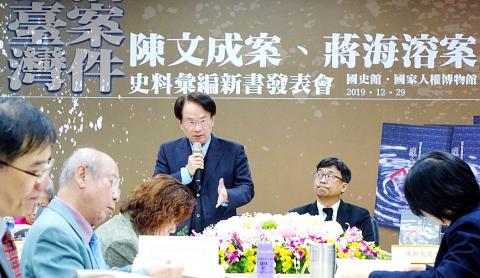The Academia Historica is to publish a compilation of historical materials related to late democracy activist Chen Wen-chen (陳文成), including documents that link Chen’s case to the Kaohsiung Incident, the academy’s curator said.
The records, for which historians previously had to apply for access to view, became available in book form, as well as digitally, starting yesterday, curator Chen Yi-shen (陳儀深) said.
The academy’s role as presidential record-keeper gave it a particular responsibility to publish the materials, which include interrogation transcripts and briefings that were provided to former president Chiang Ching-kuo (蔣經國), Chen Yi-shen said.

Photo: Chu Pei-hsiung, Taipei Times
One of the records’ most important functions, he said, would be to strengthen the historical connection between Chen Wen-chen’s mysterious death in 1981 and the government’s crackdown on a demonstration organized by the Kaohsiung-based political journal Formosa Magazine two years earlier in what came to be known as the Kaohsiung Incident.
Although Chen Wen-chen was spared the events of 1979 because he was working as a mathematics professor in the US, he had come to the authorities’ attention as one of Formosa Magazine’s main financial backers, Chen Yi-shen said.
Chiang’s order — recorded in a December 1979 diary entry — to “cut the roots out” of the magazine, resulted in a much more wide-ranging investigation than is traditionally understood, Chen Yi-shen said.
Chen Wen-chen returned to Taipei on May 20, 1981, to visit his family. On July 2, 1981, he was taken for questioning by the Taiwan Garrison Command, a since-disbanded security force.
While the government said that Chen Wen-chen was released after questioning, his body was discovered the next day on the campus of National Taiwan University.
Transcripts of the interrogation that took place on July 2, as well as briefings later given to Chiang, focus on Chen Wen-chen’s fundraising for the magazine, which he did by collecting donations and sending them by check to activist Shih Ming-te (施明德), the curator said.
Given Chiang’s fear that activists were receiving help from Beijing, the authorities also questioned Chen Wen-chen on the magazine’s political aims, pressing him to admit that its support for multi-party rule was an attempt to foment rebellion against the Chinese Nationalist Party (KMT), Chen Yi-shen said.
By giving academics and the public greater access to these documents, the curator said he believes Chen Wen-chen’s case would be reassessed, allowing it to be seen as an extension of the Kaohsiung Incident rather than something that occurred in isolation.
The greater mystery is how the young activist died, and on this subject, there is still much information that needs to be declassified, he added.

SHIPS, TRAINS AND AUTOMOBILES: The ministry has announced changes to varied transportation industries taking effect soon, with a number of effects for passengers Beginning next month, the post office is canceling signature upon delivery and written inquiry services for international registered small packets in accordance with the new policy of the Universal Postal Union, the Ministry of Transportation and Communications said yesterday. The new policy does not apply to packets that are to be delivered to China, the ministry said. Senders of international registered small packets would receive a NT$10 rebate on postage if the packets are sent from Jan. 1 to March 31, it added. The ministry said that three other policies are also scheduled to take effect next month. International cruise ship operators

NUMBERS IMBALANCE: More than 4 million Taiwanese have visited China this year, while only about half a million Chinese have visited here Beijing has yet to respond to Taiwan’s requests for negotiation over matters related to the recovery of cross-strait tourism, the Tourism Administration said yesterday. Taiwan’s tourism authority issued the statement after Chinese-language daily the China Times reported yesterday that the government’s policy of banning group tours to China does not stop Taiwanese from visiting the country. As of October, more than 4.2 million had traveled to China this year, exceeding last year. Beijing estimated the number of Taiwanese tourists in China could reach 4.5 million this year. By contrast, only 500,000 Chinese tourists are expected in Taiwan, the report said. The report

The Forestry and Nature Conservation Agency yesterday launched a gift box to market honey “certified by a Formosan black bear” in appreciation of a beekeeper’s amicable interaction with a honey-thieving bear. Beekeeper Chih Ming-chen (池明鎮) in January inspected his bee farm in Hualien County’s Jhuosi Township (卓溪) and found that more than 20 beehives had been destroyed and many hives were eaten, with bear droppings and paw prints near the destroyed hives, the agency said. Chih returned to the farm to move the remaining beehives away that evening when he encountered a Formosan black bear only 20m away, the agency said. The bear

Chinese embassy staffers attempted to interrupt an award ceremony of an international tea competition in France when the organizer introduced Taiwan and displayed the Republic of China flag, a Taiwanese tea farmer said in an interview published today. Hsieh Chung-lin (謝忠霖), chief executive of Juxin Tea Factory from Taichung's Lishan (梨山) area, on Dec. 2 attended the Teas of the World International Contest held at the Peruvian embassy in Paris. Hsieh was awarded a special prize for his Huagang Snow Source Tea by the nonprofit Agency for the Valorization of Agricultural Products (AVPA). During the ceremony, two Chinese embassy staffers in attendance